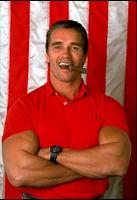 Don't think of an elephant includes one chapter which demonstrates both the strengths and the limitations of Lakoff's effort to bring language theory to political practice. I'm particularly interested in this story because I worked (and in a way am still working) in the campaign he describes. "Enter the Terminator!" is dated October 13, 2003, locating it in the immediate aftermath of the California recall election in which Arnold Schwarzenegger pushed Democrat Gray Davis out of office a mere year after Davis had been elected in a landslide.
Don't think of an elephant includes one chapter which demonstrates both the strengths and the limitations of Lakoff's effort to bring language theory to political practice. I'm particularly interested in this story because I worked (and in a way am still working) in the campaign he describes. "Enter the Terminator!" is dated October 13, 2003, locating it in the immediate aftermath of the California recall election in which Arnold Schwarzenegger pushed Democrat Gray Davis out of office a mere year after Davis had been elected in a landslide. Lakoff enumerates very cogently some ways the media framed the story of the recall and evaluates them briefly:
- Voter Revolt -- ignored Republican-engineered pseudo-populist scheming;
- The Great Noncommunicator (Davis) -- locates failure too much in one politician, too little in Democrats generally;
- Kooky California -- standard national media dismissal of the country's largest, most diverse state;
- The People Beat the Politicians -- more phony Republican pseudo-populism;
- Just a Celebrity -- a subset of the Kooky California theme, explaining nothing;
- Right Wing Power Grab -- a Democratic frame that Davis never managed to put across.
For Lakoff, the story of the recall election is the story of the perfect fit between Schwarzenegger's Terminator character and a majority of the public's desire for the reassurance of a "strict father" leader after Enron-induced electricity shortages and the shock of 9/11.They don't explain why a lot of union rank-and-file members ignored their unions' support for Davis and voted for Arnold against their self-interest. They don't explain why a great many Hispanics voted for Arnold instead of Bustamante. They don't explain Arnold's popularity with women despite the revelations against him of sexist behavior.
I'm not about to say Lakoff gets this wrong. He clearly gets a lot right. But there was more going on. During the 2003 campaign, I worked against a rightwing initiative also on the ballot that would have outlawed state collection and use of racial demographic information; we smashed Prop. 54, against the supposed conservative tide. Yes, the voters were in the mood for a strict father figure; the campaign I worked for ran ads featuring Dr. C. Everett Koop of all people! But I think Lakoff underplays the extent to which Davis and the California Democratic Party set themselves up for their loss.
As I argued here, Democrats, with our diverse coalition of jostling communities, win by speaking to hope, not fear. Davis had won the governorship (twice!) by casting himself the lesser evil against unattractive Republican opponents. He actually managed to influence the selection of the inept Bill Simon in 2002 by running ads against the more attractive Richard Riordan in the Republican primary. Once he was elected, he delivered little to the constituencies that put him in office -- Davis was a remote figure who managed to win without making any real friends. Meanwhile California Democratic politicians, despite controlling reapportionment, cut a deal with the minority Republicans that guaranteed that no seats would change party in legislative elections. Both at the Gubernatorial and the legislative levels, Democrats conspired to take competition between moral visions out of politics, to render elections mere perfunctory exercises in marketing. In the recall, they had no idea how to present themselves as appealing. And so Democrats stood no chance when confronted with 1) real public anxiety and 2) an opponent who embodied one of the polar moral archetypes of politics.
However, since getting elected, Arnold has gone a long way toward proving that playing a strict father in the movies isn't enough to captivate the public permanently. This spring I had the privilege of working with the California Nurses Association to help cut the Terminator down to size. By trying to marginalize nurses, teachers and firefighters as "special interests," Arnold set up a direct conflict between the two value systems underlying US political contests: strict father morality v. nurturance, fear v. hope. He's not faring very well when subjected to a direct comparison and determined opponents; plummeting polls suggest that the public trusts the people who work responsibly to teach their kids and keep them alive more than a phony animated hero. This fall's special election will be a further test of the limits of selling fear; I expect to enjoy working in it.
No comments:
Post a Comment